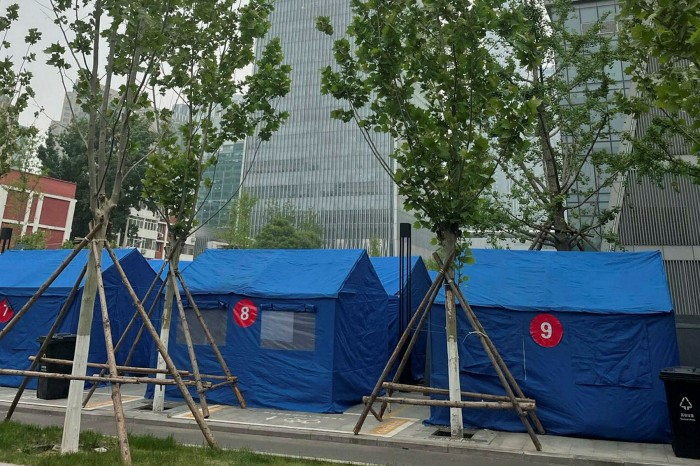In normal times, the Guanghuali apartment compound near the foot of one of Beijing’s tallest skyscrapers would buzz with afternoon activity, but these days only men in white protective suits watch over its prison-like empty courtyards.
Guards are stationed at the bottom of every stairwell, while a second line monitors a compound perimeter that has been fortified in places by makeshift blue fencing.
CCTV cameras already keep a close eye on the fence, but one guard responsible for a five-metre stretch said he was still needed in case residents tried to make a run for it. “The cameras can’t block them,” he said.
It is a scene increasingly common in the Chinese capital as authorities use tough isolation tactics to try to stamp out a Covid-19 outbreak and stave off a citywide lockdown of the sort that has paralysed financial hub Shanghai for more than six weeks.
Guanghuali was locked down on May 5 after only two coronavirus cases were found among the thousands of residents of its 37 low-rise blocks. But Beijing officials consider the resulting hardships to be the necessary collateral damage of President Xi Jinping’s zero-Covid policy.
For weeks, Beijing has teetered on the brink of a full, no-one-leaves-home lockdown as officials roll out a steady stream of new restrictions to daily life. Online images and stories of hunger and desperation in Shanghai have put the capital’s 21mn residents on edge. Rumours on Thursday of a possible lockdown sent thousands back to stores for a new wave of panic-buying.
Office buildings, restaurants and malls have been emptied, while hundreds of coronavirus testing tents have popped up outside. Every day, long lines of masked Beijingers waiting for throat swabs snake around street corners. All residents of the city’s largest district Chaoyang, which has a population of 3.5mn, had by Monday undergone 17 rounds of compulsory Covid-19 testing since April 25.
Beijingers are keenly aware that officials in China’s smaller cities have taken even tougher action over many fewer cases than the dozens reported in the capital each day. Japanese investment bank Nomura said the number of Chinese people living under some form of lockdown had fallen, but 290mn people in 41 cities were still under restrictions as of May 10.

The Omicron outbreak is posing an unprecedented test to Xi’s zero-Covid strategy. But despite huge economic disruption, Chinese Communist party proclamations make clear even discussing dropping the policy is politically dangerous.
For those in Beijing not in quarantine, a “health code” program within the WeChat messaging app has become an essential passport to daily life. To enter grocery stores or parks that remain open, they must scan QR codes and wait for the program to approve them with a ding sound and an automated voice saying “pass”.
The program stores Covid-19 test results and tracks location data, prompting some residents to turn off their phones when moving around. Just passing a high-risk area in the street can cause the program to show a pop-up message warning that the user’s health status “cannot be confirmed”.
Some of the local neighbourhood communities that implement coronavirus controls require residents who get such a message to self-quarantine for three days, while others tell them to take another Covid-19 test.
In the city’s north-west, tens of thousands of students at elite universities have been confined to their campuses. The authorities at Tsinghua University have erected fences to separate students from faculty and some canteen staff have been asked to sleep on the dining hall floors.
For Shi Wei, an administrator at a multinational company, problems began when a colleague who had briefly ventured on to her office floor for a bite to eat later tested positive.
A local branch of the Chinese Center for Disease Control and Prevention (CDC) on Wednesday deemed Shi a “close contact over time and space” — even though she had not seen the colleague — and she was told to prepare to go to an official quarantine.
There was no quarantine room available in her district, so officials installed a sensor on her front door to make sure she isolated at home.
Hours later the CDC branch lifted the quarantine order. But Shi’s freedom was brief. By Thursday afternoon she had been reclassified again, this time as a “high-risk person” requiring 10 days of home quarantine.
“It’s been so confusing and chaotic and different places have different rules,” she said.

Beijing’s methods do appear to be keeping Omicron in check for now. On Monday, the city reported only 39 new cases, 34 of which involved people already in isolation.
After the Guanghuali complex was locked down, two additional cases were detected on May 7 among residents confined to their flats. “They’ve come to take away a dozen people or so,” said a 26-year-old guard, who recently left the military and now sits at the bottom of a stairwell or helps ferry food and packages to residents.
As the number of people in isolation grows, so has the demand for guards. At Guanghuali, one guard until recently worked as a restaurant chef. Another was a young student keen to make some money while his vocational school was closed. They receive Rmb300 ($44) a day for their 12-hour shifts and sleep in tents pitched on asphalt.
“Almost anybody will do, they just need to be able to bear some suffering,” said Li Fei, a recruiter who has sent dozens of guards to quarantine sites around Beijing for the city government. “There are a lot of people out of work right now,” said Li. “If they tell us they need 100 people, we can find them in a couple of hours.”
Arjun Neil Alim contributed reporting from Beijing

